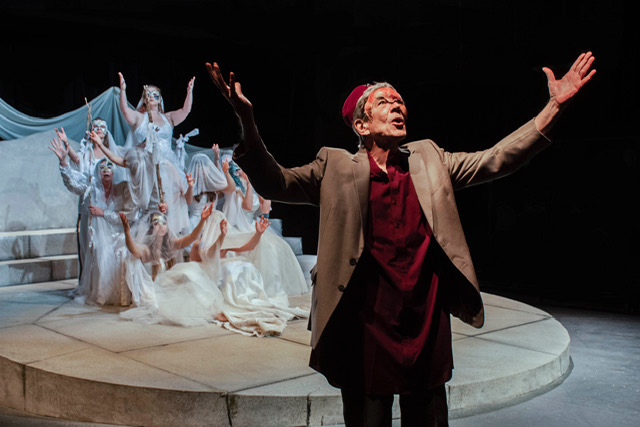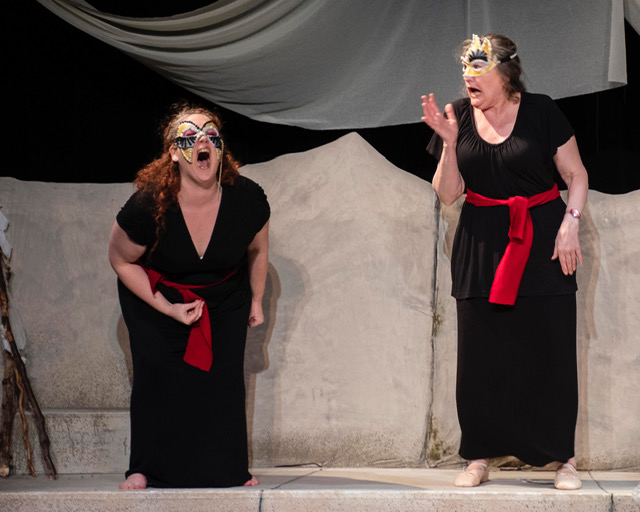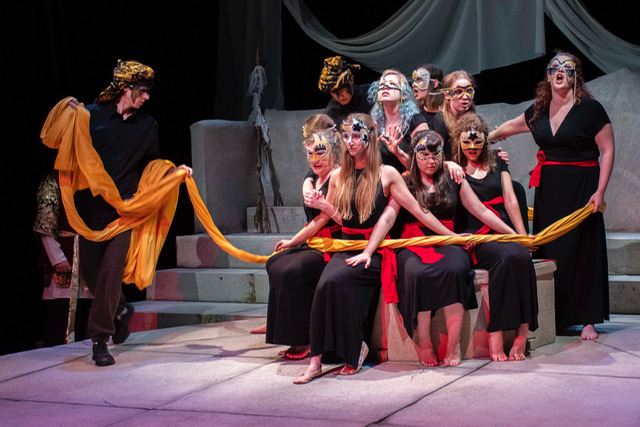
Credit: Nancy Caldwell
At Jericho Arts Centre until December 2, 2018
Tickets from $22 at unitedplayers.com or 604-224-8007
Posted November 12, 2018
With hundreds of thousands of asylum seekers on the move all over the world, The Suppliant Women, adapted from Aeschylus by Sally Clark and Adam Henderson, could hardly be more relevant. The women in Aeschylus’ play, however, aren’t fleeing from war, famine or poverty but from the pending forced marriages to their cousins – contrary to the laws at the time against such marriages.
As the story goes, Aegyptus, the usurping King of Egypt, has ordered the marriages of the fifty daughters of his twin brother Danaus (Douglas Abel) to his own fifty sons. Outraged, fearful and in defiance of the royal orders, the women set sail with their father for Argos in hopes that the Argive king, King Pelasgus (Jeremy Burtenshaw), will give them sanctuary.
And therein lies the conflict: if Pelasgus harbours them, it will lead to war with Egypt. If he forces the women’s return, they face punishment or incestuous marriage to men they hate.
If you thought referenda were modern, not so; democracy was in its infancy when Aeschylus wrote the play – circa 450 BCE and, accordingly, Pelasgus went to the people of Argos. How did they want to proceed? Surprisingly, they voted to grant asylum to the women and risk war with Egypt.

Credit: Nancy Caldwell
Doubtless, the play was controversial twenty-five hundred years ago not only for the subject – the right for women to marry whomever they wished – but for its ground-breaking structure: the chorus, which up to that point had functioned as a commentary on the protagonist and on the action, actually is the protagonist in The Suppliant Women. In this United Players’ production the chorus is eleven strong and sometimes speaks in unison, sometimes individually or in small groups.
John R. Taylor places the action on a faux marble greyish white set with a small ‘altar’ midstage and a crumbling wall upstage. White sheers form a loosely draped curtain stage right. It’s simple, elegant and functional – a fine setting for the play that is neither comedy nor tragedy – assuming comedy ends in marriage and tragedy ends in death. (It takes the completion of the playwright’s tetralogy for the tragic events to unfold.)
Costume designer CS Fergusson-Vaux must have emptied ValuVillage or a few consignment stores to put all eleven women in different, long, beautiful white wedding gowns. Later they peel off the gowns to reveal black tunics with scarlet sashes. Kimira Bhikum fashioned beautiful jewel-encrusted half masks. The effect of the dresses, masks and the marble set make this a very handsome show. Appearing as the women are Tara Webster, Sally Clark, Noelle Ansaldi, Valerie Neduha, Islay McKechnie, Amy Laity, Kaelee Steele, Mika Deneige, Dahlia-Raphael Kerr, Jessica-Jean Braun and Breanne Doyle. In addition to the Abel and Burtenshaw, Jake Anthony, Riley Bugaretsi and Isidro Rodriguez portray the men.

Credit: Nancy Caldwell
The adaptation lacks subtlety in a couple of respects: the chorus speaks very formally, appeals fervently to Zeus and their mother Io, invokes Aphrodite and Artemis and frequently moves with arms outstretched and chorally intoning lines like, “Save us from the lust of men.” The men in the play, however, move naturally, are dressed more or less contemporarily and speak colloquially: “Don’t piss me off”, says Pelasgus. Or, “Enough about me. How about you?” At another point the women are referred to as, “a band of disobedient bitches”. The message is obvious: gender inequality has persisted for at least a couple of thousand years. “Give us ownership over our lives. Gods, give women equal power”, the chorus pleads. While women in the Western world have made significant gains, women in the Third World have not fared as well.
The houselights come up moments before The Suppliant Women ends and the chorus, facing the audiences, repeatedly cries, “Women of the world stand up or the world will end. And we haven’t got long”. It’s a passionate rallying cry that puts the audience on the spot but I’m not sure just what Aeschylus or the adaptors Clark and Henderson (who also directs) expect. Is this an appeal to women to stand up for refugees worldwide? Or an exhortation for women to become politically engaged for a more compassionate – even, perhaps, greener – world? Or maybe a plea for women to fight for stiffer penalties for men who abuse them? Or all of the above? Whatever the ‘ask’ is, it’s fervent and very, very direct.
I don’t know if women running the show would make for a better, more peaceful world. But surely the message must be, “Women and men of the world stand up or the world will end. And we haven’t got long.”

